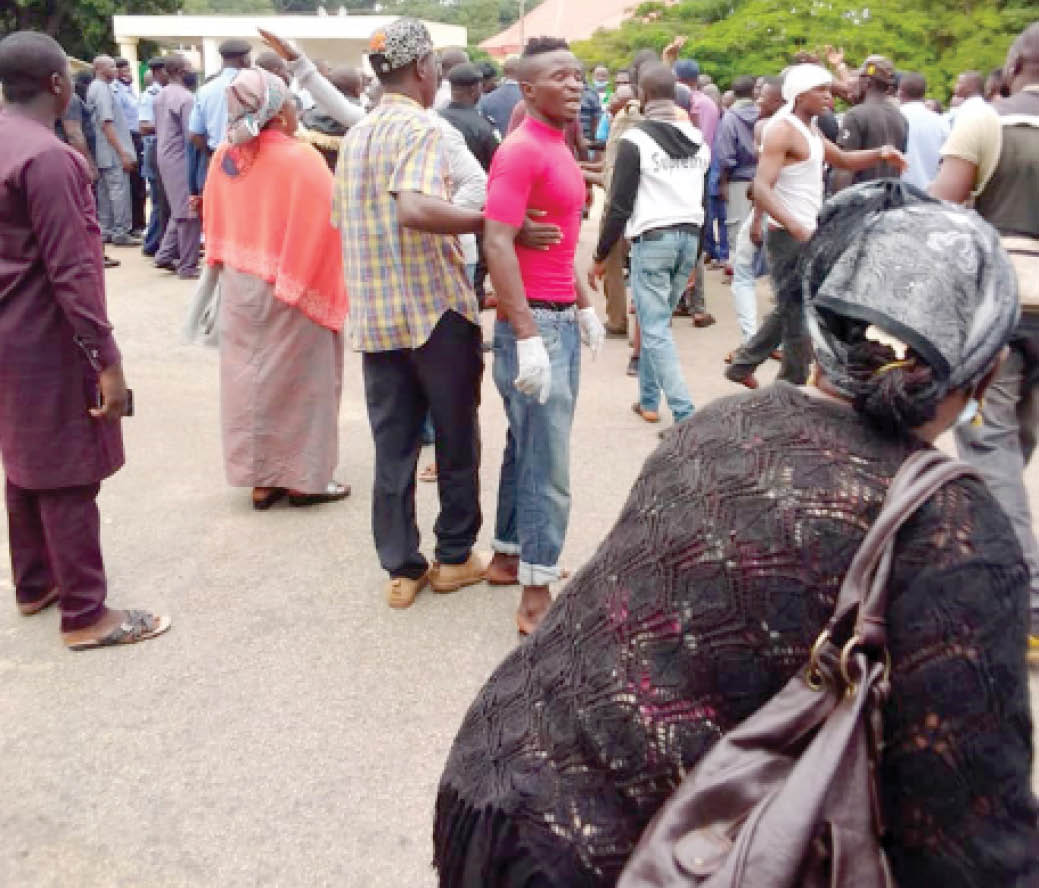Youths and the 2023 general elections
Youths, the world over, are noted for a plethora of positive qualities. Youths are vibrant. They are virile. They are industrious. They are zestful. They are productive. And they are patriotic. It is a measure of their inordinate energy, fervour and zeal that they are enlisted into the martial services. They fight gallantly to defend […]

Youths protesting in Jos
Youths, the world over, are noted for a plethora of positive qualities. Youths are vibrant. They are virile. They are industrious. They are zestful. They are productive. And they are patriotic.
It is a measure of their inordinate energy, fervour and zeal that they are enlisted into the martial services. They fight gallantly to defend the territory and integrity of their sovereign countries. They collect tax, excise and duties. They restrain and check the influx of unwanted immigrants. They incarcerate and deter errant citizens, especially those with a proclivity for crime.
Due to the fact that youths are not encumbered by family concerns, they can be adventurous. They can take calculated risks. And the higher the risks, the higher the returns.
Also, because they are strong and not hamstrung by adult challenges, youths are productive. Their boundless energies fire our manufacturing and service industries.
Furthermore, youths can be highly imaginative and creative. Consider the shimmering careers of these geniuses: Karl Heinrich Marx, philosopher, economist, historian, sociologist, political theorist, journalist and socialist revolutionary, wrote the path-breaking DAS KAPITAL at the age of 49. Marx’s intellectual accomplishments were such that by one informed account, “his name has been used as an adjective, a noun and a school of social theory.”
Albert Einstein is the equivalent of scientific genius. In 1905, referred to as “the miracle year” on account of Einstein’s unsurpassed achievements, he, at the age of 26, published four groundbreaking papers in the ANNALS OF PHYSICS. In the said papers, he developed the theory of relativity and quantum mechanics.
Our own Chinua Achebe wrote his magnum opus, THINGS FALL APART, in 1958 at the age of 28. The book turned out to be a literary feat and the most widely read and translated African novel. Wole Soyinka, who won the Nobel Prize for Literature in 1986, wrote A DANCE OF THE FOREST in 1960. A scathing criticism of Nigeria’s elite, the play nonetheless won the contest as the official play for Nigeria’s Independence Day on 1st October of that year. Soyinka was 26 years.
The above brilliant examples speak eloquently to what the youths, especially Nigeria’s irrepressible youths, can bring to the table of development and progress. Thankfully, our demographics show that ours is a largely youthful population imbued with all the notable qualities aforementioned, but waiting to be harnessed and deployed to grow our country.
In fact, in a series of engagements in late October this year, the Chairman of the Independent National Electoral Commission(INEC), Professor Mahmood Yakubu, called attention to the pivotal place of youths in our elections. He disclosed to stakeholders that of the 9,518,188 Nigerians who registered during the Continuous Voter Registration(CVR) exercise which began on June 28, 2021 and was suspended on July 31, 2022, 7.2 million of the newly registered voters, representing 76.5 per cent, were young people.
This revelation has larger meanings for our politics and the 2023 General Elections. It implies that the elections and their outcomes will be determined largely by our youths. It also means that any serious contestant or party must reckon with our youths as a formidable demographic and seek to cultivate them or address their concerns.
But the questions that must arise and arouse the interest of any student of the electoral process regarding Professor Yakubu’s disclosure must be: Are Nigerian youths informed by and seized of this crucial statistic? Are they going to be guided by their new found power in the 2023 General Elections? Will they deploy this power adroitly and patriotically to engender an uplifting change in their unhappy country? Are they prepared to work in unison and across ethnic and religious divides to bring about what amounts to a generational change through the ballot box?
The United Nations Educational Scientific and Cultural Organization(UNESCO) and the Mahatma Ghandi Institute for Peace and Sustainable Development(MGIEP) insist that: ”Youths need to have the ability to question, assess and evaluate issues to arrive at the most peaceful and optimal solutions.” For youths to accomplish this, the two organisations enthuse that youths “need to be mindful of the global environment and its intercultural environment…and be equipped with the appropriate skills set for driving social, environmental and economic progress….”
From this writer’s many interfaces with our highly talented youths, and based on the chastening they have received via years of bad governance, one is persuaded that they have the requisite disposition to come together, to strategise and to vote in such a fashion as to bring about a sea change. Never before have our youths been so traumatised. And never before has privation and suffering prepared them to defer to what Frantz Fanon once pronounced in his classic, THE WRETCHED OF THE EARTH. Fanon had written that: ”Each generation must, out of relative obscurity, discover its mission, fulfill it or betray it”.
The crucially important 2023 General Elections await and beckon our patriotic youths. They must use their votes wisely to foster a generational change, devoid of violence and acrimony.
Nick Dazang is a former Director at the Independent National Electoral Commission (INEC)
